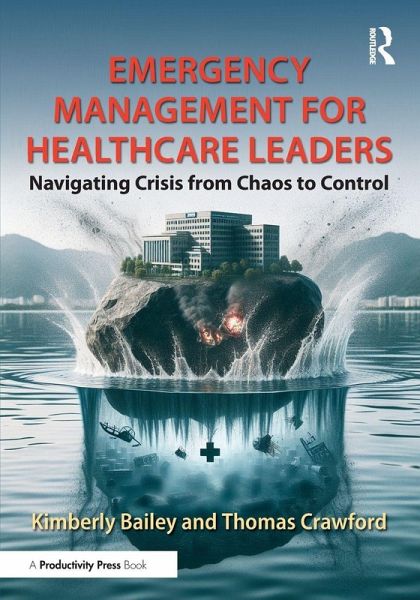Emergency Management for Healthcare Leaders
Navigating Crisis from Chaos to Control
Versandkostenfrei!
Versandfertig in 1-2 Wochen
Weitere Ausgaben:

PAYBACK Punkte
37 °P sammeln!




The modern healthcare landscape is rife with an array of potential emergencies, from natural disasters to public health crises, cybersecurity threats to mass casualty incidents.
Kimberly Bailey holds a master's degree in emergency management and Homeland Security from Arizona State University and a bachelor's degree in English. She is a South Carolina State Certified Emergency Manager and a Certified Emergency Management Accreditation Program Assessor/Accreditation Manager, among other certifications, including former Nationally Registered Paramedic and Certified Healthcare Simulation Educator. Currently, Kimberly serves as the System Executive Director of Emergency Management for the Medical University of South Carolina (MUSC) Health System. MUSC Health is a prominent academic medical center operating more than 1,600 beds across all hospitals and facilities. Kimberly's role at MUSC Health involves coordinating emergency management standards, collaborating with various agencies, managing emergency operations centers, and leading projects such as the development of the High-Risk Infectious Disease Unit. Previously, she held significant roles including Academic Associate for Arizona State's Emergency Management and Homeland Security Program, South Carolina Department of Health Emerging Infectious Disease Planner and the Bureau of Public Health Preparedness Training and Exercise Manager for the South Carolina Department of Health (formerly known as the South Carolina Department of Health and Environmental Control). Kimberly served on the executive leadership team of the South Carolina Emergency Management Association (SCEMA), including a role as Treasurer from 2020 to 2023. In this capacity, she played a pivotal role in guiding the association's strategic direction and financial oversight. Kimberly's contributions reflect her deep commitment to advancing the field of emergency management and fostering collaborative relationships among those professionals and all stakeholders. Kimberly has contributed to numerous publications and articles on operational communications and simulation scenarios in emergency medical services. She has presented at various conferences and summits on topics related to emergency management and healthcare preparedness. Her extensive experience in emergency management and her role in shaping preparedness strategies highlight her expertise and dedication to improving healthcare emergency responses. Dr. Thomas C. Crawford is a seasoned integrated healthcare (hospitals and physician practices) executive (President/CEO/COO) and decorated collegiate educator (four excellence in teaching awards from the University of Florida) that has consistently delivered collaborative accomplishments within health systems, rural and metropolitan hospitals, and physician practices. He has a track-record of exceptional proven successes developing system¿wide strategic initiatives that contributed to enhanced market positioning, consistent bottom¿line profitability/growth, and advanced clinical and financial performance. Additionally, Dr. Crawford has consistently elevated physician and employee engagement by partnering to drive best-in-class operational efficiencies while focusing on enhancing the quality and safety of the care delivered. Lastly, Dr. Crawford's leadership efforts have been recognized locally, regionally, and nationally via numerous awards and honors - as a Marlon Fitzwater Medallion recipient to, most recently, being named 1 of Becker's 75 Health System COOs to Know in 2023 and 1 of 60 Academic COOs to Know in 2024.
Produktdetails
- Verlag: Taylor & Francis Ltd
- Seitenzahl: 178
- Erscheinungstermin: 25. März 2025
- Englisch
- Abmessung: 254mm x 178mm x 10mm
- Gewicht: 338g
- ISBN-13: 9781032867908
- ISBN-10: 1032867906
- Artikelnr.: 71849657
Herstellerkennzeichnung
Libri GmbH
Europaallee 1
36244 Bad Hersfeld
gpsr@libri.de
Für dieses Produkt wurde noch keine Bewertung abgegeben. Wir würden uns sehr freuen, wenn du die erste Bewertung schreibst!
Eine Bewertung schreiben
Eine Bewertung schreiben
Andere Kunden interessierten sich für














